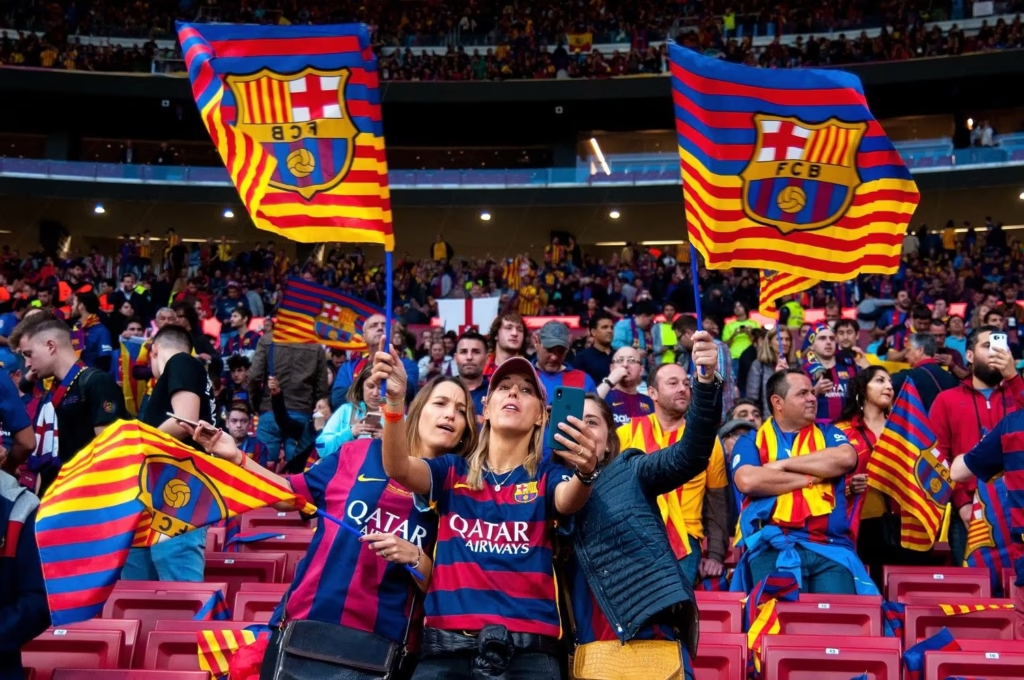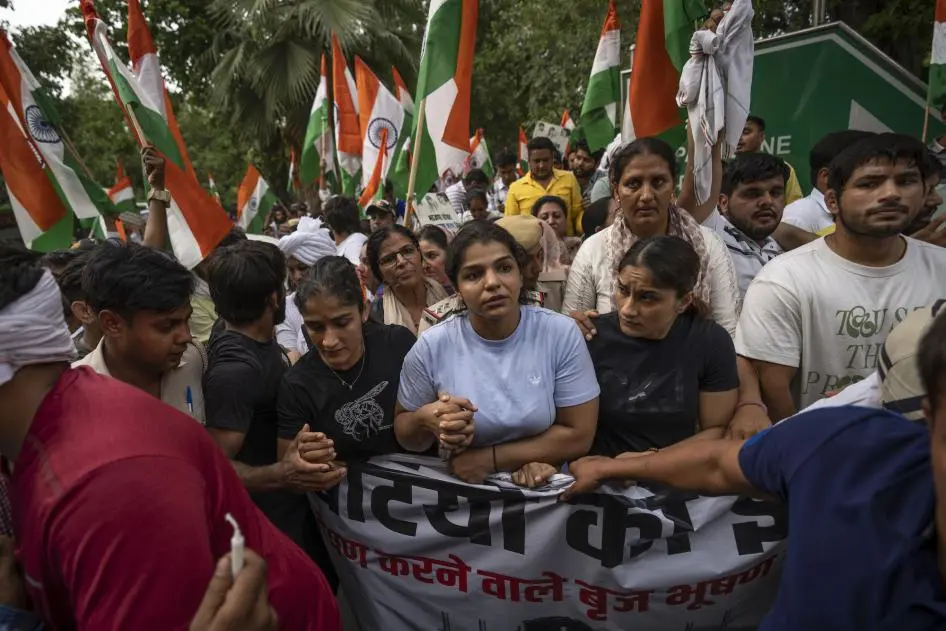The Catalan Soul of Barcelona
FC Barcelona’s identity is inseparable from its Catalan roots. Founded in 1899 by Joan Gamper, a Swiss entrepreneur who had fallen in love with Catalonia, the club quickly became a symbol of Catalan culture and resistance. This connection runs deeper than geography; it’s woven into the very fabric of what Barcelona represents.
Catalonia, with its distinct language, culture, and history of struggle for autonomy, found in Barcelona a voice when political expression was often suppressed. During Franco’s dictatorship (1939-1975), when the Catalan language was banned and cultural identity suppressed, Camp Nou became one of the few places where Catalans could express their identity freely. Chanting in Catalan, displaying the regional flag, and supporting Barcelona became acts of cultural preservation and quiet rebellion.
This historical context explains why Barcelona’s fanbase extends far beyond typical football support. For millions of Catalans and those who identify with the cause of cultural independence, supporting Barcelona is supporting their identity, their language, and their right to exist as a distinct people within Spain.

The Real Madrid Rivalry: More Than Football
The El Clásico rivalry between Barcelona and Real Madrid transcends sport, embodying one of the most politically charged matchups in world football. While Real Madrid became associated with Spanish centralism and the Franco regime—earning the nickname “the regime’s team”—Barcelona represented Catalan resistance and regional pride.
This dynamic created a rivalry that goes beyond tactics, transfers, and trophies. When Barcelona and Real Madrid face each other, it’s not just two football clubs competing; it’s a clash between different visions of Spain, between centralism and regionalism, between conformity and cultural diversity. The intensity of this rivalry has helped forge Barcelona’s identity as the club of the oppressed, the voice of those who feel marginalized by central authority.
Even today, decades after Franco’s death, this historical weight gives every El Clásico an emotional charge that few sporting rivalries can match. For Barcelona fans, beating Real Madrid isn’t just about football supremacy—it’s about validating their cultural identity and asserting their right to be different.
Building Community Through Grassroots Connection
Barcelona’s approach to community building extends far beyond the professional team. The club’s commitment to its Catalan identity permeates every level of the organization, creating a comprehensive ecosystem that nurtures both athletic talent and cultural connection.
La Masia: More Than an Academy
Barcelona’s youth academy, La Masia, serves as perhaps the perfect example of how the club integrates identity with development. Beyond producing world-class players like Lionel Messi, Xavi, and Andrés Iniesta, La Masia instills the club’s values and philosophy in young players. The academy emphasizes not just technical skills but also understanding of Barcelona’s history, culture, and playing philosophy.
Players who graduate from La Masia don’t just join Barcelona—they become ambassadors of the club’s identity. This creates a unique bond between the team and fans, who see their cultural values reflected in the players wearing the shirt.
Local Engagement and Social Programs
Barcelona’s community approach extends into numerous social initiatives throughout Catalonia. The club operates educational programs, supports local businesses, and maintains strong connections with Catalan cultural institutions. This isn’t corporate social responsibility—it’s cultural responsibility, acknowledging the club’s role as a custodian of Catalan identity.
The club’s foundation works extensively in the community, using football as a vehicle for education, integration, and social development. These programs reinforce Barcelona’s position as more than an entertainment entity—they establish the club as a community cornerstone.

Media and Communication: Preserving Language and Culture
Barcelona’s approach to media and communication reflects its commitment to Catalan identity. The club produces content in Catalan, promotes local journalists and media figures, and ensures that the language remains visible in all official communications. This might seem like a small detail, but for a language spoken by roughly 10 million people and historically suppressed, this representation is significant.
The club’s media strategy also emphasizes storytelling that connects current events with historical context. When Barcelona signs a new player or wins a trophy, the narrative often includes references to the club’s cultural mission and Catalan values. This consistent messaging helps maintain the emotional connection between club and community across generations.
The Importance of Identity in Modern Football
In an era of globalization, financial speculation, and franchise-style ownership, Barcelona’s approach offers a compelling alternative model. The club demonstrates that success and authenticity aren’t mutually exclusive—that maintaining strong cultural roots can actually enhance rather than limit global appeal.
Fan Loyalty and Emotional Investment
Barcelona’s deep cultural connections create a level of fan loyalty that pure marketing cannot achieve. Supporters don’t just follow the team; they feel ownership of its mission. This emotional investment translates into sustained support through both triumph and adversity, creating a stable foundation that many clubs lack.
The club’s membership structure—with over 140,000 registered socios (members) who elect the president and influence major decisions—reinforces this sense of ownership. Fans aren’t just consumers; they’re stakeholders with real influence over the club’s direction.
Global Appeal Through Authentic Identity
Paradoxically, Barcelona’s strong local identity has enhanced its global appeal. In a world where many institutions feel generic and corporate, Barcelona offers something authentic and meaningful. International fans are drawn not just to the football but to the story—the idea of supporting a club that stands for something beyond profit.
This authentic identity creates deeper connections with fans worldwide who may not speak Catalan or fully understand the political context but appreciate the club’s commitment to its values and community.
Challenges and Evolution
Maintaining cultural identity while competing in global football presents ongoing challenges. The financial pressures of modern football, the need to attract international talent and investment, and the demands of global marketing can sometimes conflict with local priorities and traditional values.
Barcelona has had to navigate these tensions carefully, finding ways to honor its Catalan identity while remaining competitive on the world stage. The club’s approach to these challenges—prioritizing long-term cultural sustainability over short-term financial gains—offers lessons for other institutions trying to maintain authenticity in an increasingly globalized world.
Més Que Un Club: A Model for the Future
FC Barcelona’s community approach, rooted in Catalan identity and cultural connection, represents more than a successful football strategy—it’s a blueprint for how organizations can maintain meaningful relationships with their communities while achieving excellence.
The club’s example demonstrates that identity isn’t a limitation but a source of strength. By staying true to its Catalan roots, Barcelona has created something far more valuable than a successful football team: a cultural institution that gives millions of people a sense of belonging, pride, and continuity.
In a world where many institutions struggle to maintain relevance and connection, Barcelona’s approach offers hope that authenticity and success can coexist. The club proves that when organizations genuinely serve their communities and stay true to their values, they don’t just survive—they thrive.
As football continues to evolve and globalize, Barcelona’s model reminds us that the most powerful connections aren’t built through marketing campaigns or financial investments, but through shared identity, common values, and genuine commitment to community. In this sense, FC Barcelona truly is més que un club—it’s a testament to the enduring power of cultural identity in creating lasting human connections.
For other clubs and organizations looking to build deeper community relationships, Barcelona’s approach offers valuable lessons: authenticity resonates, identity creates loyalty, and serving something larger than yourself generates returns that go far beyond any balance sheet. In the end, Barcelona’s greatest victory isn’t any trophy they’ve won—it’s the community they’ve built and the culture they’ve preserved.



